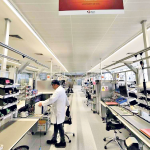Novo Banco rescue “most disastrous set up in Europe”
Portugal’s finance minister Mário Centeno stirred up a hornets’ nest this week after stating in parliament that the Resolution Fund created to bail out Novo Banco was the “most disastrous fund” of its type ever set up in Europe.
The statement from the Eurogroup president immediately caused embarrassment for Portugal’s Prime Minister António Costa, who it emerged this week did not know that a tranche of some €850 million was paid out of State coffers into the Resolution Fund to keep the bank solvent until after the event had happened.
Oil when he then pored onto fire when the minster said that there was an overlap of some time between making the transfer and informing the Prime Minister as “I don’t do the things by text messaging from the beach shoreline.”
However, from the left to the right, MPs were in uproar in the Portuguese parliament this week saying that the Government had no right to transfer the money to the bank until the conclusions of an audit into the bank’s finances had been published.
The brouhaha resulted in the Prime Minister António Costa meeting with Mário Centeno at the prime minister’s residence on Wednesday for talks. It was widely speculated that the finance minister would resign. However, he will continue in his post.
So far, the various cash injections paid to keep Novo Banco afloat have cost the banks and the tax payer over €5Bn.
The left-wing parties accused the Government of paying billion to the bank so the US vulture fund Lone Star will end up with a bank ready to sell on at a profit, while those companies that bought portfolios of toxic loans would also profit and the bank’s top brass would all get their bonuses and all paid with taxpayers’ money.
Novo Banco was created in 2014, supposedly as a ‘Good bank’ to house customer accounts and good assets and loans after the collapse of the Banco Espírito Santo empire in 2014.
The Resolution Fund was set up by the Portuguese State to provide funds for the new bank with an initial capitalisation of nearly €5Bn from all the other Portuguese banks and the State and also some €380 million already in the fund provided from troika lending.
In parliament Centeno said: “Everyone has known, since the very beginning, that if there is a problem, it is because (the solution for) Novo Banco was badly resolved. It was, in fact, the most disastrous bank resolution ever set up in Europe”.
During his address, Mário Centeno reminded MPs that Novo Banco hadn’t “been created in 2019.”
“If loans have to be made on an annual basis it’s because in 2014, when BES was split into a ‘good bank’ and a ‘bad bank’, the selection of assets was badly and incompetently done,” said the finance minister.
“The new bank, which should have had only good assets, ended up by having a lot of toxic ones. Because of a “disorderly resolution” in 2016, the Portuguese State paid more than €1.5Bn in interest because of Novo Banco” he said.
This, he argued, was why the sale of Novo Banco and the agreement to the cash transfers were the “lesser of two evils” and had to be done “in the name of financial stability.” It was a concern that “not all past governments had exercised in a competent way” he said alluding to the opposition PSD party which had been in power at the time.
The PSD answered through MP Afonso Oliveira by saying: “It was not our fault, surely (that the transfer was made), it was the Prime Minister’s and the Finance Minister who forgot to advise him about the transfer.”
The MP wanted to know why there had been this miscommunication between the prime minister and the finance minister, and if the treasury had made the transfer without the knowledge of the prime minister.
“No, it was not done ignoring the prime minister. Not a single Government decision is taken without the agreement of the Council of Ministers” said Centeno, who accused the PSD of having “signed the disastrous resolutions on the beach” when they had been in power.
The €850 million for Novo Banco was factored into the State Budget for 2020 so that Novo Banco could close its 2019 accounts with liquidity ratios in line with those demanded by the banking authority, the Bank of Portugal.
Despite reporting huge losses — €1.056Bn in 2019 – Novo Banco continues to pay salary bonuses for its senior managers with Socialist MPs reported in the newspaper Público as stating that the policy is “creating a sense of utter disbelief among the general public”.
Novo Banco hired a new chief financial officer in 2019, Mark Bourke, and paid him a €320,000 bonus in order to get him. The Board of Directors earned €2.3 million in bonuses in 2019 according to the bank’s annual financial accounts report for 2019.










